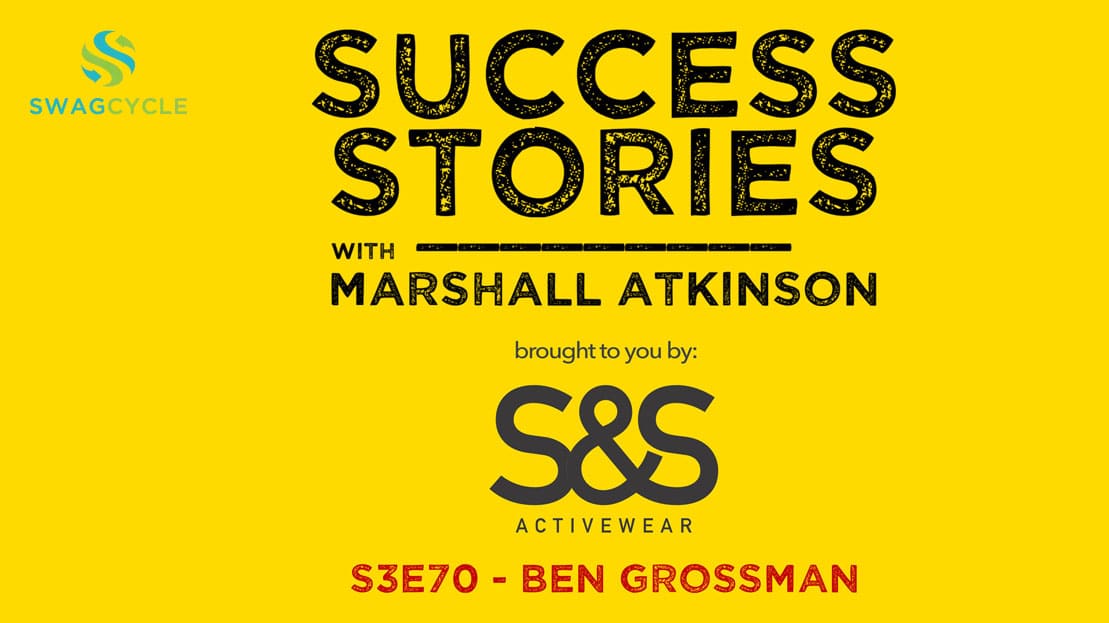SwagCycle Founder Ben Grossman was recently a guest on the Success Stories podcast, where he spoke with host Marshall Atkinson about how SwagCycle leverages its network of partners to help companies repurpose and recycle unwanted branded items in a responsible, ethical, and affordable way. Read on for highlights from their conversation.
SwagCycle launched in 2019 to help promotional products distributors, suppliers, and decorators, as well as end user organizations, divest of their goods in a responsible way.
“We’ve seen the challenge of goods becoming obsolete virtually overnight when companies change their brand when an acquisition happens and they change their marketing messaging,” Grossman shared. “As someone who has been deeply involved in sustainability causes for many years, seeing good quality items go in a landfill was personally painful to me. I wanted to build a platform with my team to try to address this challenge of what to do with obsolete apparel and branded merchandise and divert those items from landfills.”
Clothing and household textiles make up more than 6% of the waste stream in the United States, which is the equivalent of 81 pounds per person thrown away annually. At the same time, nearly 95% of our clothing and textiles can actually be reused and recycled.
“That’s where SwagCycle comes in,” Grossman said. “We help companies find ways to divest of these goods in reasonably easy ways to keep them out of landfills and help facilitate reuse and recycling, which makes it easier on the decorators, distributors, and suppliers, and most importantly, their clients, to try to manage their brands properly and treat the environment as responsibly as we all can.”
SwagCycle helps companies match their obsolete branded merchandise items with the right charitable or recycling partners to leave the smallest footprint possible.
SwagCycle tries first and foremost, Grossman explained, to create social impact in the community by sending those goods to worthy charitable partners like the YMCA, Boys and Girls Clubs, Dress for Success, and a whole host of others.
“We have partnerships with several hundred organizations around the United States and world,” Grossman explained. “We don’t charge a fee for facilitating donations – the only cost is the shipping cost to get the goods from their warehouse or their client’s office to the charity.”
Items that are unable to be donated, either because of their condition or at the company’s request, are recycled for a fee. Apparel, for instance, can be sent to one of SwagCycle’s textile recycling partners in the United States to be shredded and turned into things like carpet pad fill, industrial wiping claws, and insulation materials.
SwagCycle’s goal, Grossman shared, is to make the largest impact possible. From its launch in 2019 through the end of 2022, SwagCycle kept more than 1.4 million items out of landfills and facilitated more than $2.5 million in charitable donations.
Grossman discussed highlights from recent SwagCycle projects, including working with Facebook around their rebrand to Meta, facilitating the donation and recycling of nearly 20,000 items.
“Landfill diversion is the key term here, and trying to work toward a more circular economy, and helping organizations make the most responsible choices with their goods, whether that’s helping facilitate charitable donations, which we are deeply passionate about, or helping them dispose of their items in a responsible way,” Grossman shared. “So those goods don’t end up in landfills, and we find higher and better uses for the raw materials.”
As consumers increasingly look to buy from and work for environmentally-conscious companies, Grossman suggests there are many things those in the promotional merchandise industry can do to improve their sustainability.
“At the outset, we should be thinking about the whole product lifecycle, and we can hopefully make tasteful recommendations to our clients to make things that are useful, practical, have a high perceived value and a long shelf life so they get used for a long time. Brand new merchandise creates a lot of goodwill between a company and the recipient, and the goal is that these goods get used and not just thrown away,” Grossman said.
Listen to the full podcast episode here.
Does your company have obsolete branded merchandise you’d like to keep from becoming waste by having it matched with a good cause? We can help! Learn more about how SwagCycle can help your company or organization repurpose, recycle, and donate your branded merchandise.



